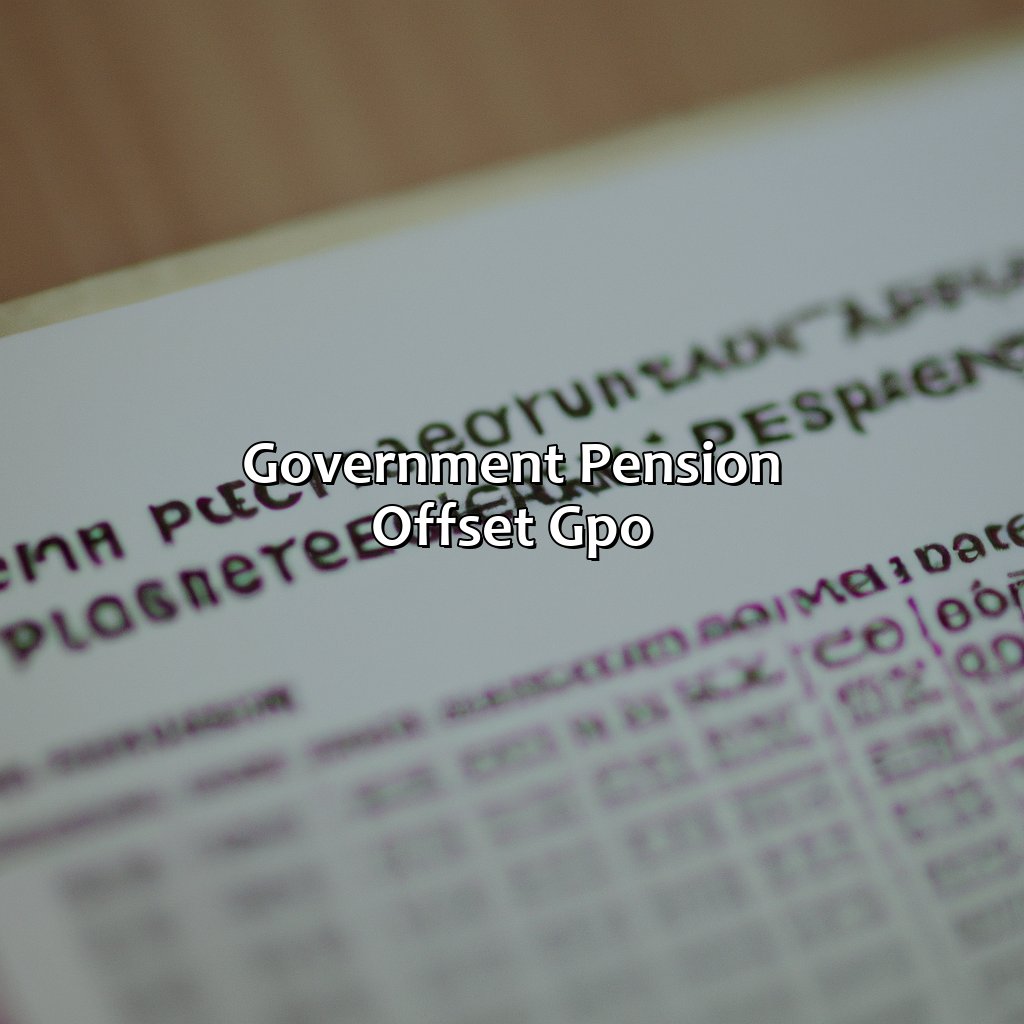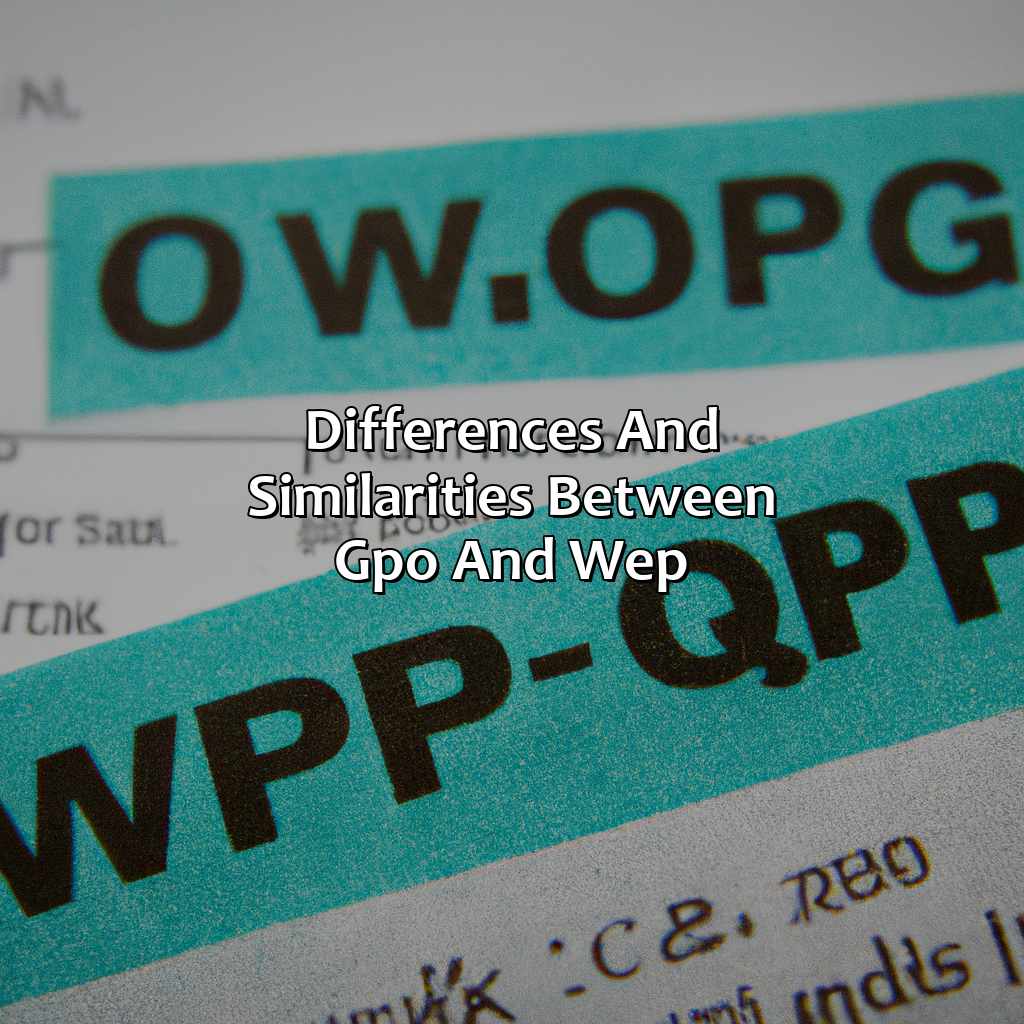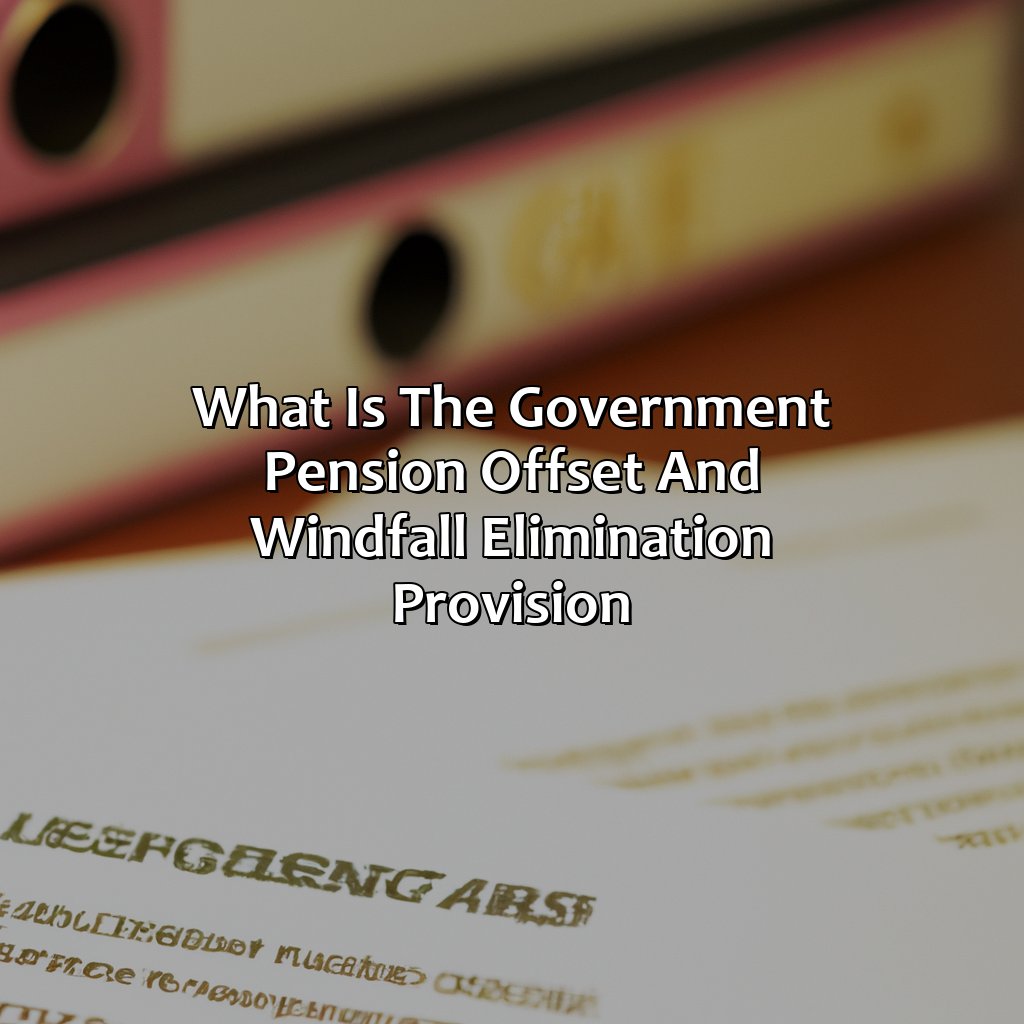What Is The Government Pension Offset And Windfall Elimination Provision?
Key Takeaway:
- The Government Pension Offset (GPO) reduces Social Security spousal or survivor benefits for individuals who receive a government pension based on work not covered by Social Security. The offset amount depends on the amount of the government pension and can eliminate the entire spousal or survivor benefit.
- The Windfall Elimination Provision (WEP) reduces an individual’s Social Security retirement benefits if they receive a pension from work not covered by Social Security and also have a substantial earnings history under Social Security. The amount of the reduction depends on the number of years of substantial earnings under Social Security.
- GPO and WEP have some similarities but also differences. Both provisions affect Social Security benefits received by individuals who have worked in jobs not covered by Social Security. However, GPO affects spousal or survivor benefits, while WEP affects retirement benefits. Non-compliance with GPO and WEP can result in significant reductions in retirement income.
You may be confused by the terms of the Government Pension Offset (GPO) and Windfall Elimination Provision (WEP). These two rules may significantly reduce or eliminate Social Security benefits for some individuals, making it important to understand how they work. Learn how to make sure you receive your full Social Security benefits.
Government Pension Offset (GPO)
Do you want to understand GPO’s effects on Social Security Benefits? Read on! This section explains all about GPO. We will explore three parts:
- Explanation of GPO
- GPO and Social Security Benefits
- Who is Affected by GPO
Get a succinct understanding of how GPO works!

Image credits: retiregenz.com by David Jones
Explanation of GPO
The Government Pension Offset (GPO) is a provision that governs the payment of Social Security spousal or survivor benefits to individuals who receive government pensions. The GPO applies to those who worked for state or local governments and did not pay into Social Security. Instead, they paid into retirement plans that are separate from the Social Security system. Under the GPO, any spousal or survivor benefits an individual may receive from Social Security will be reduced by two-thirds of their government pension amount. This reduction is meant to ensure that those with government pensions receive similar treatment as those who contributed to Social Security.
It is crucial to note that the GPO does not apply to all government workers. Those who worked for the federal government and are eligible for Federal Employees Retirement System (FERS) or Civil Service Retirement System (CSRS) do not fall under this provision. Additionally, those who paid into both Social Security and a government pension will also not be affected by the GPO.
For instance, a teacher named Mary works as an educator in a public school and receives a pension from her job. She is also eligible for her husband’s Social Security benefits once he retires. However, due to the GPO provisions, Mary’s spousal benefits will be reduced by two-thirds of her pension amount. As a result, Mary will receive significantly less in combined income than she would without the offset provision.
Looks like the government is getting really good at robbing us twice – first with the GPO and now with the WEP.
GPO and Social Security Benefits
Government Pension Offset (GPO) reduces Social Security benefits for those who receive a government pension based on work that was not covered by Social Security. GPO applies to spousal, widow, or widower’s benefits. If you are eligible for both a government pension and Social Security benefits, the GPO will offset your Social Security payments.
Moreover, the reduction is equal to two-thirds of the amount of your government pension. For instance, if your monthly pension payment is $900 from employment that was not covered under Social Security and you are also entitled to a spouse’s benefit of $500 from Social Security, your spousal benefit will be reduced by $600 per month.
To avoid losing out on future payments, it is crucial to know if you are affected by the Government Pension Offset provision when planning retirement income strategies. A financial advisor can assist in developing an effective strategy to increase your retirement savings.
Sorry retirees, if you have a government pension on one hand and a Social Security spousal benefit on the other, it’s time to start practicing your juggling skills.
Who is Affected by GPO
Individuals who receive a government pension instead of Social Security benefits may be subject to the Government Pension Offset (GPO). The GPO affects those who worked for a government employer that did not withhold Social Security taxes from their pay. It is particularly relevant for individuals who are married or widowed and are entitled to receive Social Security spousal or survivor benefits based on the earnings of their spouse.
The GPO reduces an individual’s monthly Social Security benefit by two-thirds of their government pension. For example, if someone receives a government pension of $1,500 per month, then their Social Security benefit would be reduced by $1,000 per month. Therefore, it is important for affected individuals to plan accordingly and have alternative sources of income in retirement.
To avoid the effects of GPO, some individuals choose to work for an employer who withholds Social Security taxes for a sufficient number of years to be eligible for full benefits. Another option is to have supplemental savings through an Individual Retirement Account (IRA) or other retirement plan.
If you want to know how to avoid government pension offset, these options can be helpful.
Overall, it is crucial to understand how the GPO works and its potential impact on retirement income. Taking proactive measures such as working for a Social Security-covered employer or having adequate savings can help mitigate its effects.
Say goodbye to your retirement dreams, because WEP is here to make sure you can’t have your cake and eat it too.
Windfall Elimination Provision (WEP)
To comprehend Windfall Elimination Provision’s impact on your Social Security benefits, we’ll chat about sub-sections in this area. WEP’s explanation will give you a general thought. Then, we’ll explain how WEP affects Social Security benefits and who it affects.

Image credits: retiregenz.com by Joel Woodhock
Explanation of WEP
The Windfall Elimination Provision (WEP) is a Social Security rule that adjusts the benefit calculation for individuals who receive pension payments from jobs not covered by Social Security. This rule prevents them from receiving two benefits that do not reflect their entire earnings history. The WEP reduces an individual’s Social Security benefit proportionally to the total years of employment with a non-Social Security covered employer.
Moreover, the government pension offset (GPO) is another provision where a person’s Social Security spousal or survivor’s benefits are reduced if they receive a pension from a federal, state or local government job not covered by Social Security. The GPO reduces 2/3 of their government pension from their spousal or survivor’s benefits. However, if their own work history includes Social Security coverage, the GPO does not apply.
It is crucial to note that some states have separate retirement systems for their public employees and may be subject to the WEP as well as GPO. This can affect teachers, firefighters and police officers’ retirement benefits when they retire.
Mrs Jennifer was excited about retiring soon and had planned out her expenses down to the last cent. She had worked as a teacher in Florida’s school district but had no social security taxes withheld because she had participated in her state’s Teacher Retirement System throughout her teaching career. Upon claiming her Social Security benefits after retirement, Mrs Jennifer learned about the government pension offset (GPO) and windfall elimination provision (WEP) provisions. Unfortunately, she found out that these provisions would reduce her expected Social Security income significantly more than what she had initially thought, disrupting her plans and budgeting entirely.
Looks like the government found a new way to blow away our Social Security benefits – with the Windfall Elimination Provision.
How WEP Affects Social Security Benefits
The Social Security Administration imposes the Windfall Elimination Provision (WEP) to reduce retirement benefits for those who have worked both in jobs covered by Social Security and jobs exempt from it. This may result in a lower benefit amount than anticipated.
WEP applies to individuals who earned a pension from work not covered by Social Security, like state or local government, and also receive Social Security retirement or disability benefits. WEP reduces the recipient’s Social Security benefit by up to $480 per month as of 2021 if they have 20-29 years of substantial earnings under Social Security. Those with 30 or more years of coverage are impacted less severely.
It is important to note that WEP does not affect all public sector employees. Only those receiving pensions based on non-Social Security covered employment would be subjected to reductions in their Social Security Retirement benefits.
A retiree named Mark retired with two pensions: one from his job under Social Security and one from a government job exempt from it. As a result, WEP reduced his Social Security benefit amount by over $400 monthly, leaving him with much less income than he had anticipated for retirement.
Even if you’ve been saving up for retirement since the age of dinosaurs, WEP will still find a way to rain on your parade.
Who is Affected by WEP
The Windfall Elimination Provision (WEP) affects those who receive pensions from non-covered employment and Social Security benefits. This provision can reduce the amount of monthly Social Security retirement or disability benefits for these individuals. The WEP only applies to those who worked in a job not covered by Social Security but are also eligible for Social Security because they worked in other jobs that were covered.
If you receive a government pension and have not paid into Social Security, WEP can affect your benefit amount. It is important to note that WEP does not eliminate benefits entirely, but rather adjusts the amount based on how many years a person worked outside of Social Security-covered employment.
One unique detail about WEP is that it only affects those who first become eligible for both a government pension and Social Security after 1985. Those who became eligible before this time are grandfathered into different rules. Additionally, certain types of government pensions, such as those from federal or state jobs with minimal Social Security coverage, may be exempt from pension reforms.
In the past, there have been proposals to modify or repeal the WEP due to its complex nature and potentially negative impact on affected individuals’ retirement funds. However, as of now, it remains an active provision in the United States social security system.
Trying to understand the differences and similarities between GPO and WEP is like trying to explain quantum mechanics to a toddler.
Differences and Similarities between GPO and WEP
We have broken down this section into three parts to better understand GPO and WEP. First, we will compare them. Second, we will see how they impact your retirement benefits. Lastly, we will look at the consequences of not following GPO and WEP.

Image credits: retiregenz.com by Yuval Duncun
Comparison between GPO and WEP
When it comes to Government Pensions, there are two main provisions, GPO (Government Pension Offset) and WEP (Windfall Elimination Provision). Here is a comparison between the two.
| GPO | WEP | |
|---|---|---|
| Who’s affected? | Retirees who receive government pensions not covered by social security. Affects spouses or widows eligible for social security on their own work record. | Roughly, anyone who worked in a job where social security taxes were not withheld but later qualified for social security benefits through other employment. |
| Impact on benefits | The amount of Social Security spousal or survivor benefits can be reduced by 2/3 of the amount of the government pension.
E.g If you get $1500 from your government pension and you would qualify for $1000 in Social Security spousal benefits, you would only receive $166 because ($1500/3) = $500. |
The benefit formula used by Social Security when calculating retirement payments is modified. The modification typically leads to lower payments – an individual may lose between $438 per month at full retirement age and $900 per month if retiring early. |
It’s essential to note that while both might affect a retiree’s Social Security Benefits, they address different scenarios.
Retirees with military and civil service jobs have a higher chance of being hit by GPO. As such, it’s advisable to understand how one could be affected.
With many more private workers likely to rely on social security after retirement, understanding what applies in one’s situation is necessary. Don’t miss out on receiving the full benefits of your retirement package.
Retirement benefits are like a game of Jenga: one wrong move with GPO or WEP, and the whole tower comes crashing down.
How GPO and WEP Affect Retirement Benefits
Retirement benefits can be affected by GPO and WEP. When receiving Social Security benefits, some individuals may also get pensions from government positions outside the system. The Government Pension Offset (GPO) reduces the Social Security spousal or survivor benefit for those who receive a pension from work not covered by Social Security. In contrast, the Windfall Elimination Provision (WEP) affects individual workers who earned pensions from employers that didn’t pay into the Social Security system and can reduce a worker’s Social Security retirement benefit.
It is important to note that the impact of GPO and WEP on your retirement benefits can vary based on various factors such as age at retirement, years of service under a pension plan, amount of wages paid before entering a non-covered job, and much more. However, if you are curious about what is the pension plan, it is highly recommended to seek guidance from professional financial advisors to address these issues effectively.
If you are unsure about how these provisions could affect your future financial stability during retirement or if want to optimize your overall social security benefits – it’s best to take action now rather than regretting later on missing out on potential additional income in the future.
Consequences of Non-Compliance with GPO and WEP
One may face severe consequences by not complying with the regulations of GPO and WEP. The government pension offset and windfall elimination provision can both significantly reduce retirement income for those who violate their requirements; more so than an individual would think. Meeting the eligibility criteria of both programs is essential to avoid losing a significant chunk of one’s retirement benefits.
It is imperative to note that non-compliance may lead to delayed or reduced Social Security and pension payments, resulting in a much lesser amount of benefits. One may also be asked to repay any overpayments received previously, making this situation urgent for every individual. To understand more about pension adjustment, it is recommended to consult with qualified professionals in the field.
Additionally, legal action could be enforced on violators; however, some exemptions exist depending on specific circumstances such as illegal acts or fraud cases. In light of these consequences, it is in one’s best interest to stay compliant with GPO and WEP regarding their regulations.
History shows that many individuals have suffered unpleasant consequences due to non-compliance with GPO and WEP regulations. For example, the Social Security Administration has brought numerous court cases against retired teachers and public employees who refuse to comply with the rules of windfall elimination provision leading to payment delays or lowered benefits. It highlights how seriously government agencies take non-compliance, emphasizing why every citizen must adhere to policies set under these two critical provisions.
Five Facts About the Government Pension Offset and Windfall Elimination Provision:
- ✅ The Government Pension Offset (GPO) affects individuals who receive a pension from a federal, state, or local government job not covered by Social Security. (Source: Social Security Administration)
- ✅ The GPO reduces the spousal or widow(er) Social Security benefits of those who also receive a government pension. (Source: AARP)
- ✅ The Windfall Elimination Provision (WEP) affects individuals who worked in jobs where Social Security taxes were not withheld but also worked in other jobs that were covered by Social Security. (Source: Social Security Administration)
- ✅ The WEP reduces the Social Security benefits people can receive based on their non-covered job earnings. (Source: AARP)
- ✅ The GPO and WEP can significantly reduce the Social Security benefits of affected individuals, making it important to plan accordingly for retirement. (Source: Investopedia)
FAQs about What Is The Government Pension Offset And Windfall Elimination Provision?
What is the government pension offset and windfall elimination provision?
The government pension offset (GPO) and windfall elimination provision (WEP) are two rules that affect Social Security benefits for people who receive a pension from a government job, such as a teacher or police officer.
How does the government pension offset work?
The GPO reduces Social Security spousal or survivor benefits by two-thirds of the amount of a government pension received. For example, if a retired teacher receives a $1,500 monthly pension, their Social Security spousal benefit could be reduced by $1,000.
How does the windfall elimination provision work?
The WEP reduces the Social Security retirement or disability benefit for people who also receive a government pension from a job where they did not pay Social Security taxes. The reduction in benefits depends on the number of years the person paid into Social Security.
Who is affected by the government pension offset and windfall elimination provision?
People who receive a government pension from a job where they did not pay Social Security taxes, and who are also eligible for Social Security spousal or survivor benefits or retirement or disability benefits, may be affected by the GPO and WEP.
Is there a way to avoid the government pension offset and windfall elimination provision?
There is no way to completely avoid the GPO and WEP, but some government employees may be exempt from these rules if they have paid enough Social Security taxes over their lifetime.
Where can I get more information about the government pension offset and windfall elimination provision?
You can get more information about the GPO and WEP on the Social Security Administration website or by contacting your local Social Security office.


